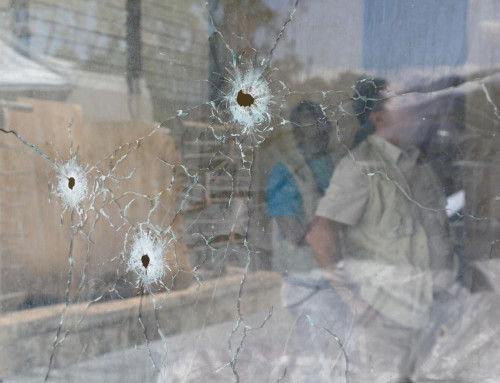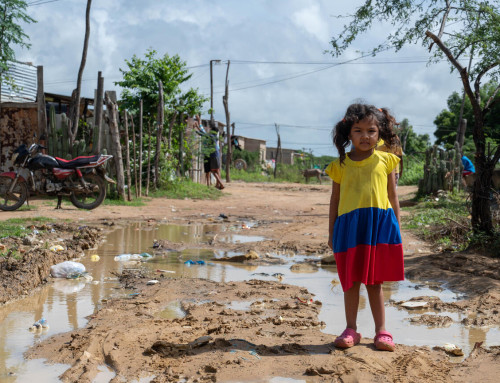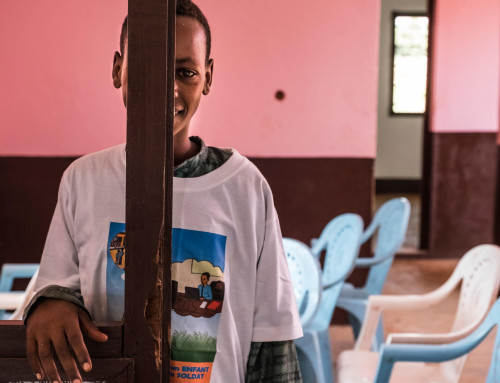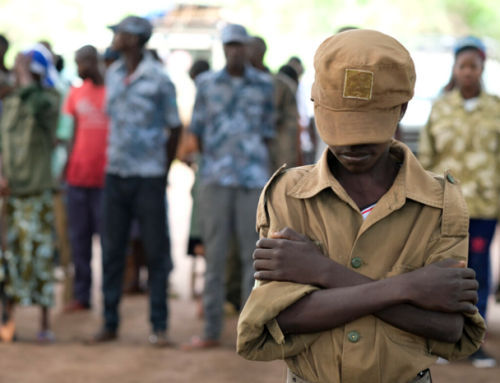New York – During the presentation of her annual report to the General Assembly, the Special Representative of the Secretary-General for Children and Armed Conflict, Ms. Leila Zerrougui, stated that constructive engagement with Member States, in collaboration with child protection partners, is crucial to end and prevent the recruitment and use of children.

Leila Zerrougui presents her annual report to the Third Committee of the General Assembly. Copyrights: Ali Clare/ OSRSG-CAAC
Since her last report to the General Assembly, the Government of the Democratic Republic of the Congo has signed an action plan to end and prevent the recruitment and use of children as well as sexual violence against children. The Government of Yemen has also endorsed an Action Plan to end the recruitment and use of children by the country’s armed forces. This commitment is expected to be ready for formal signature between the Government and the United Nations in November.
Of the eight Government forces currently listed for recruitment and use of children in the Annexes of the Secretary-General’s Annual report on Children and Armed Conflict, six – Afghanistan, Chad, the Democratic Republic of the Congo, Myanmar, Somalia and South Sudan- are currently working towards ending the recruitment and use of children in their security forces.
“In Chad, significant efforts are ongoing towards reaching full compliance with the Action Plan signed in 2011,” said Leila Zerrougui during her presentation to the General Assembly.
An Engagement to Sustain and Reinforce Partnerships.
During her presentation, the Special Representative reiterated her engagement to sustain and reinforce partnerships between all actors involved in the protection of children affected by armed conflict.
“Working to sustain these partnerships has been and will continue to be a key priority during my tenure,” said the Special Representative during the presentation of her annual report to the General Assembly.
In addition to her ongoing work with the European Union, the Special Representative has signed a new partnership agreement with the African Union to ensure that protecting children is a central element of peace and security initiatives on the continent.Ms. Zerrougui also continues to reach out to other regional and intergovernmental organizations such as the Arab League, the Organization of Islamic Cooperation and ASEAN to develop strategic partnerships to address children’s needs.
Leila Zerrougui told the General Assembly that no one can single-handedly accomplish the difficult task of addressing the impact of conflict on children. Member states, the United Nations and civil society partners have to support each other for the sake of children affected by conflict.
She concluded her presentation by urging States and regional organizations to include children’s needs in peace agreements as well as in broader peace building, recovery and development initiatives.
[embed_content id=”9107″]
Read SRSG Zerrougui’s Statement to the Third Committee of the General Assembly:
Mr. Chairman,
Distinguished delegates
Dear colleagues,
I am honored to be here today with Mr. Lake, Ms. Santos-Pais, Ms. Sandberg, and Ms. Maalla M’jid to provide an update to the Third Committee on the situation of children and armed conflict and participate in this interactive dialogue.
Mr. Chairman,
While important advances in protecting children are ongoing and a lot has been achieved in the last two decades, in many places around the world, the scourge of violent conflict continues to blight the lives of children.
In Central African Republic, for instance, thousands of vulnerable children are bearing the brunt of violence since the relapse into conflict.
These are children who have been abducted or re-recruited into armed groups, often in very remote areas, who have been victims of sexual violence and denied basic humanitarian assistance, health care and education.
In addressing the ongoing crisis, there is a need for robust interventions to sustain their protection and reintegration into a fit environment.
During my visit to Syria, I saw first hand the devastating impact of another conflict on the lives of children.
Not only children have been victims of grave violations, but they have witnessed the deaths of family members and the destruction of their homes. They have missed months if not years of schooling.
So far, over four million children have been directly affected by the conflict; one million of those reside outside of the country.
But Syrian children are not alone:
Tens of millions of children are deprived of their only chance to get an education because of armed conflict. The consequences are devastating and the impact will be seen for generations to come.
Throughout 2012 and 2013, we have also witnessed a trend of killing and maiming of children including by all means of warfare and in particular by the use of explosive weapons.
Whether as part of asymmetric warfare or terror tactics, hospitals, schools, medical personnel, teachers and school children have also been the target of attacks, in disregard of their protected status under international humanitarian law.
Arrest and detention of children on security charges and without due process is another practice affecting thousands of children in today’s conflict.
Mr. Chairman,
These daunting challenges can only be addressed through innovative broad-based partnerships and collaboration: Member States, United Nations entities, regional organizations, civil society and communities all have an important role to play in building a better future for children affected by armed conflict.
Working to sustain these partnerships has been and will continue to be a key priority during my tenure. Working collaboratively with UN actors – some of whom are sitting right beside me today — is central to my mandate.
My experiences have shown me that no single UN entity can alone accomplish the difficult task of addressing the impact of conflict on children. This is why we are coordinating our multidimensional expertise, our complementary and mutually reinforcing mandates, to make a difference in children’s lives.
In this regard, I am pleased to report that efforts are underway with health and education partners within and outside the United Nations system to reinforce the policy and operational frameworks to strengthen access to healthcare and education during conflict.
In addition to our ongoing work with the European Union, this year was marked by the signing of a partnership agreement with the African Union. This will allow us to collaborate even more closely with African Member States and the African Union in support of its important and ever growing role in maintaining peace and building stability in the Continent.
I will continue to reach out to other regional and intergovernmental organizations, like the League of Arab States, the Organization of Islamic Cooperation and ASEAN: it is my hope that my Office and mandate can serve as a convening forum to bring together regional actors in addressing the specific challenges of protecting children affected by conflict in their regions.
Mr. Chairman, distinguished delegates, dear colleagues
Constructive engagement and partnership with Member States, especially those who are still in the process of building national institutions and professionalizing their security forces is crucial to ensure prevention of child recruitment.
To further advance this goal, I have initiated a global campaign to end the recruitment and use of children by Government security forces in armed conflict by 2016. This initiative, which aims to deepen cooperation with Governments that have committed to ending under-age recruitment and jointly with child protection partners, regional organizations and civil society, assist them in this endeavor.
Progress is already underway:
Six action plans are currently being implemented. I am also happy to announce that following my visit to Yemen, the Government has adopted an Action Plan elaborated with the support of the United Nations. In Chad, joint efforts are ongoing towards reaching full compliance with the Action Plan signed in 2011.
Mr. Chairman,
Experience in conflict-affected countries shows that if we don’t start early, opportunities will be missed to protect children from the impact of armed conflict. Integration of child protection concerns in mediation processes and peace agreements is vital.
It provides the opportunity for children to be released; it also allows the international community to plan and mobilize resources for these children to be reintegrated and return to normalcy in the longer term.
Finally, it creates the framework to establish national policies and mechanisms to prevent children from being re-recruited or marginalized in societies which are transitioning from conflict to peace.
Mr. Chairman, distinguished delegates, ladies and gentlemen,
I urge on parties to conflict to commit to the immediate cessation of all violations, including recruitment and use, killing and maiming, abductions, sexual violence, and attacks on schools and hospitals.
I welcome the new ratifications of the Optional Protocol to the Convention on the Rights of the Child on the Involvement of Children in Armed Conflict, and I encourage the remaining Member States who have not done so, to sign, ratify and implement this important instrument.
I also wish to call on Member States and regional organizations to continue to acknowledge the devastating consequences of armed conflict on children in mediation processes, and to include measures to address children’s needs in broader peacebuilding, recovery and development efforts.
I urge Member States to address the severe effect of explosive weapons on children by upholding in all circumstances the principles of precaution, distinction and proportionality. I further encourage Member States to sign, ratify and implement the Arms Trade Treaty.
As an international community we must also shift from recognising the deadly interaction between armed conflict and education, to proactively building an even more robust framework to strengthen education in emergencies.
The children and armed conflict mandate is only as strong as the support that it receives. It is my hope that Member States will continue to sustain their efforts in support of the work of the United Nations and other child protection actors through their political support, expert advice and resources.
I count on your support in together redoubling our efforts.






